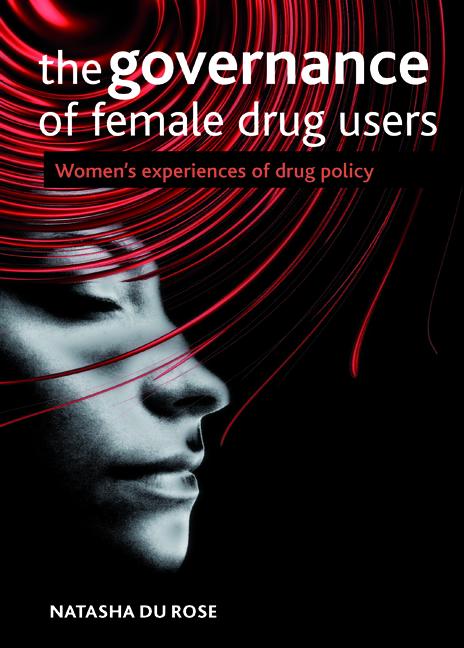five - Welfarisation
Published online by Cambridge University Press: 10 March 2022
Summary
Welfarisation is another technology of government through which female illicit drug users are governed. It is the process that constructs individuals or groups as needing social support, or that constitutes them as unworthy of it. Governments themselves create welfarisation through the maintenance of structural inequalities, social and economic marginalisation and its ‘management’. Certain ‘needy’ or ‘at-risk’ groups of individuals are targeted for welfarisation or ‘soft policing’ through formal and informal social control mechanisms (Worrall, 2001). Welfarisation is in principle, benevolent, and may involve the provision of support with social funds, housing, training, jobseeking or childcare. It may prove to be a lifeline for some individuals, but programmes of welfare have long been identified as having (darker) mechanisms of surveillance and social control embedded within them. This relates to Foucault's concept of the ‘carceral continuum’ and his view that regulatory techniques permeate ‘a whole series of institutions … well beyond the frontiers of criminal law’ involving doctors, social workers and educators (1991 [1975], p 297). Drawing on Foucault’s work, Cohen (1985, p 3) argues that liberal capitalist countries such as the UK, Canada and the US all have ‘social control systems’ embedded in their programmes of ‘welfare’ and ideologies of treatment.
The idea that policies of welfare also operate as mechanisms of control and surveillance particularly over marginalised groups of individuals has been explored and developed by various writers across a range of disciplines and subjects (see Parton, 1991, on child protection; Carlen, 1988, on young women in care; Carrington, 1993, on juvenile girls; Phoenix, 1999, on sex workers). Interventions into the lives of women who use illicit drugs presented as policies and practices of welfare (concerned with their wellbeing) are often experienced as intrusive, coercive and punitive (see Chapter Seven, pp 238–245 and 253–256). Mechanisms of control and surveillance, including practices of welfare, also serve to enforce gendered expectations of behaviour and to reinforce inequalities of gender. The technology of welfarisation is closely related to that of normalisation discussed in the following chapter (see Part Three, pp 142–144).
This chapter investigates the surveillance and regulation of drugusing women through welfare and social work policies and practices.
- Type
- Chapter
- Information
- The Governance of Female Drug UsersWomen's Experiences of Drug Policy, pp. 117 - 136Publisher: Bristol University PressPrint publication year: 2015

